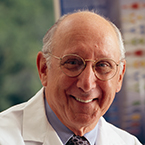
A pioneer in cancer immunotherapy research, Dr. Rosenberg led in establishing gene therapy, in developing the first effective cancer immunotherapy in humans using T-cell stimulation, and in establishing adoptive immunotherapy (adoptive cell transfer). The latter is an essential technique whereby cells, such as T cells, are extracted from a patient, expanded ex vivo, and subsequently reintroduced into the patient.
In a landmark experiment involving his adoptive cell transfer technique, he demonstrated that administration of a combination of the T-cell growth factor cytokine, IL-2, tumor-infiltrating lymphocytes, and a lymphodepleting preparative regimen stimulated complete remissions in metastatic melanoma. He built upon these findings by characterizing immunodepletion protocols and cell selection techniques, which proved effective in achieving higher cancer regression rates for metastatic melanoma patients receiving reintroduced immune cells.
Dr. Rosenberg was the first to introduce a foreign gene into a human and was also the first to successfully utilize T-cell receptors against melanoma and chimeric antigen receptors against lymphomas to genetically modify autologous lymphocytes, which subsequently mediated tumor regression when reintroduced into patients. His recent research has identified somatic mutations as targets of T-cell immunotherapy for melanoma, a finding that holds promise for the development of immunotherapy for patients with common epithelial cancers. His discoveries continue to be translated by researchers studying how to utilize techniques such as adoptive cell transfer to re-engineer the immune system to better counteract cancer.
Career Highlights
2023 National Medal of Technology and Innovation
2020 AACR-Cancer Research Institute Lloyd J. Old Award in Cancer Immunology
2019 Szent-Györgyi Prize for Progress in Cancer Research
2019 AAI-Steinman Award for Human Immunology Research, American Association of Immunologists
2019 Anthony Cerami Award in Translational Medicine, Feinstein Institute for Medical Research
2019 Edogawa NICHE Prize,Edogawa Hospital and Nichi-in Centre for Regenerative Medicine
2019 Helis Prize in Cancer Research, Baylor College of Medicine
2019 Nathan Davis Award for Outstanding Government Service, Executive Branch, American Medical Association
2018 Albany Medical Center Prize in Medicine and Biomedical Research, Albany Medical Center
2018 Excellence in Technology Transfer Award, Federal Laboratory Consortium for Technology Transfer
2018 Jacobson Innovation Award, American College of Surgeons
2018 NCI Director’s Award for Translational Science, National Cancer Institute
2017 Federal Technology Transfer Award, CCR, National Cancer Institute
2016 James Ewing Award, Society of Surgical Oncology
2016 Novartis Prize for Clinical Immunology
2015 Medal of Honor, American Cancer Society
2015 Betty Ford Lifetime Achievement Award of Distinction, Susan G. Komen Foundation
2015 Samuel J. Heyman Service to America Medals – Federal Employee of the Year, Partnership for Public Service
2012 Keio Medical Science Prize
2011 William B. Coley Award for Distinguished Research in Tumor Immunology, Cancer Research Institute
2006 Medallion for Scientific Achievement, American Surgical Association
2005 Richard V. Smalley, MD, Memorial Award, International Society for Biological Therapy of Cancer
2005 Lila Gruber Memorial Cancer Research Award, American Academy of Dermatology
2003 American-Italian Cancer Foundation Prize for Scientific Excellence in Medicine
2002 Flance-Karl Award, American Surgical Association
1996 John Wayne Award for Clinical Research, Society of Surgical Oncology
1993 Claude Jacquillat Award for Achievement in Clinical Oncology (France)
1991 David A. Karnofsky Memorial Award and Lecture, American Society of Clinical Oncology
1988 Griffuel Prize for Research, French Association for Research on Cancer
1987 Elected Member, Institute of Medicine
1968 PhD, Biophysics, Harvard University
1964 MD, Johns Hopkins University
[Institutional affiliations listed for Fellows reflect those held at the time of their induction into the AACR Academy.]